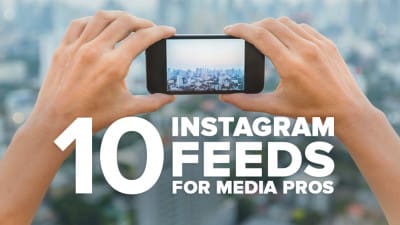6 Moves That Can Make (or Break) Your Career on Twitter was originally published by American Marketing Association.
To help wade through the world of Twitter and avoid having a tweet-gone-wrong forever saved in the Library of Congress, three social media professionals weigh in with some tips on what career marketers should do and should avoid on the decade-old, yet always evolving, social media platform.
Things to Avoid
1. Posting Without Thinking
Kathi Kruse, social media and digital marketing specialist and owner of Kruse Control, says that she’s a big advocate of “thinking before you hit send.” Right now, there’s a large number of people posting inappropriate images, videos, thoughts and musings on Twitter. This can be gravely damaging to a career, she says.
“I’m not saying people shouldn’t have their personal opinions about things politically or otherwise, but what you say and do online speaks for you,” she says. “A lot of people kind of don’t realize that because it’s just the click of a button. But the reality is, you can see it for the rest of your life practically. It really only takes one time.”
With Twitter, it just takes one Google search to go from a candidate for a new job to the rejection pile. “Tread lightly,” Kruse warns.
2. Talking Only About One Person: You
Think of Twitter like a cocktail party: Does anyone stand in the corner and maintain a conversation with the person who speaks only of themselves?
Janet Fouts, a social media strategist and CEO of Tatu Digital Media, says that this is one of the biggest mistakes that professionals can make online.
“They think they’re the hottest thing in the world and [the] smartest and no one else has any intelligence,” she says.
It’s not just joining in on conversations. That’s important, Fouts says, but even more important is sharing something another person posts, which adds value to your own network.
“Respecting the intelligence of other people and sharing their information aligns them with the people they respect,” Fouts says. “When they do that, they can really raise their status by associating with people who are super smart and sharing more info.”
3. Speaking As an Authority If You Aren’t an Authority
Don’t be a know-it-all, says Lissa Duty, social media coach and co-founder of Rocks Digital. If a marketing professional expresses themselves as an authority on Twitter when they aren’t, Duty said it will be obvious (and annoying) to followers.
“That’s one of the biggest fails they have,” she says. “They’ll try to because they feel intimidated about how long they’ve been in the industry, … pretend they know everything.”
Wanting to be an influencer is a great goal to have. Forcing yourself into that role? It won’t work, Duty says. Everyone who has experience in your industry will know when you’re faking. Be open to learning new information instead of trying to constantly bestow it.
Things to Do
1. Focus on Your Passion
It may be cliché, but Kruse says that posting what you’re passionate about is a great way for a young professional to establish themselves as a thought leader.
“Let that be your guide for how you want to be seen and establish yourself as an expert or a thought leader,” she says. “Volunteer to write content around it, certainly, but also volunteer to speak at certain places or contribute to blogs of companies that you admire. Do this proactive kind of thought leadership so that when [potential employers or partners] look back on a body of work they say ‘Oh, they are a thought leader.’”
A lot of smart companies will try to poach these Twitter thought leaders, Kruse said. Why? Because it makes the company look like a smart thought leader, by proxy.
2. Strive to Learn
There are a lot of important people on Twitter, and the smartest professionals learn from them, Fouts says.
Marketing professionals should think of Twitter as a place of professional development where they can learn from the leaders in the field. By reading and sharing these insights, marketing professionals can also help others learn, thereby helping their own brand.
3. Reach Out Within Your Range
While making friends in high places is great, Duty suggests focusing on connections with influencers who are attainable and within reach for mentorship. For example, that person with 500,000 followers may not readily respond to questions and conversation, but the person with 50,000 may. This can have immense value.
“That mentorship may not be where they’re directly saying ‘Hey, I’m your mentor,’ but someone they can look to, ask questions of, follow and look to that is an attainable goal,” she says. “Someday, they can develop the relationship and they too will be an influencer. And that’s how they grow and reach on twitter and other larger platforms.”
In fact, this is how Duty increased her influence and reach on Twitter. Her @LissaDuty account has 31.2 thousand followers, but it didn’t happen overnight. She identified three influencers who had reach beyond her own and worked toward developing a rapport with them. When their influencer status grew, Duty’s did too.
Key Takeaways
Twitter is 10 years old and has more potential to mess up your career than ever. How can marketing professionals avoid this?
Posting the wrong thing may not seem like a bad idea at the moment, but it could be career poison down the line if seen the wrong way by a company executive or HR representative.
Avoid not thinking before sending a tweet, but also be proactive in reaching out to possible mentors within your reach. Be calculated but spontaneous. Twitter is about finding the mix that works well for you.
Consider honing your Twitter skills with a Mediabistro online course on social media.
Hal Conick is a staff writer for the AMA’s magazines and e-newsletters.
The American Marketing Association is the pre-eminent force in marketing for best and next practices, thought leadership and valued relationships, across the entire discipline of marketing. Its online publications include posts on industry trends, career advice and more.










